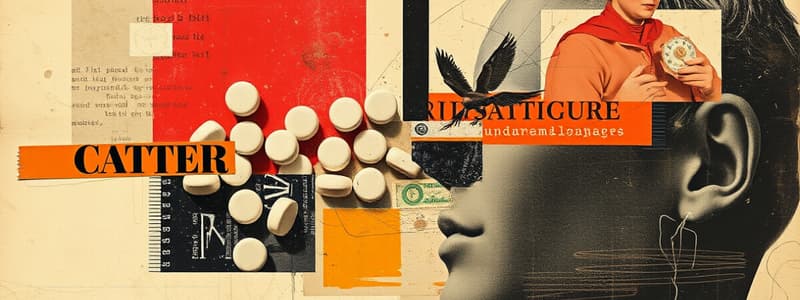Podcast
Questions and Answers
Which of the following is NOT a common side effect of Angiotensin Converting Enzyme (ACE) inhibitors?
Which of the following is NOT a common side effect of Angiotensin Converting Enzyme (ACE) inhibitors?
- Angioedema
- Postural hypotension
- Hyperkalemia
- Headache (correct)
What is a key nursing consideration when a patient is prescribed ACE inhibitors?
What is a key nursing consideration when a patient is prescribed ACE inhibitors?
- Assess for signs of respiratory infection
- Encourage abrupt discontinuation if dizziness occurs
- Monitor blood pressure frequently (correct)
- Monitor electrolytes for hypernatremia
Which disease condition is NOT treated by Angiotensin II Receptor Blockers (ARBs)?
Which disease condition is NOT treated by Angiotensin II Receptor Blockers (ARBs)?
- Hypertension
- Congestive heart failure
- Chronic lung disease (correct)
- Kidney failure in diabetes
What pharmacological effect do ACE inhibitors primarily promote?
What pharmacological effect do ACE inhibitors primarily promote?
Which condition may require caution when prescribing ACE inhibitors?
Which condition may require caution when prescribing ACE inhibitors?
Which of the following side effects may occur with anti-anginal drugs?
Which of the following side effects may occur with anti-anginal drugs?
What is the primary purpose of a transdermal patch for anti-anginal medication?
What is the primary purpose of a transdermal patch for anti-anginal medication?
Which of the following statements about anticoagulants is true?
Which of the following statements about anticoagulants is true?
Which condition is NOT indicated for the use of anti-platelet drugs?
Which condition is NOT indicated for the use of anti-platelet drugs?
Which laboratory value is crucial to monitor in patients taking warfarin?
Which laboratory value is crucial to monitor in patients taking warfarin?
Study Notes
Angiotensin Converting Enzyme (ACE) Inhibitors
- Antihypertensive drugs that promote renal excretion of salt and water.
- Lower vascular resistance without increasing cardiac output, rate, or contractility.
- Generic names end with "-pril."
- Treat hypertension, congestive heart failure, and reduce the risk of stroke and heart attack.
- Desired outcomes include controlled blood pressure, improved survival rates for acute MI, and decreased cardiovascular workload.
- Common side effects: postural hypotension, fatigue, loss of appetite, nausea, vomiting, diarrhea, hyperkalemia, insomnia, exacerbation of cough, and angioedema.
Nursing Considerations for ACE Inhibitors
- Monitor electrolytes due to potassium retention.
- Elderly clients are at higher risk for postural hypotension.
- Avoid abrupt discontinuation to prevent rebound hypertension.
- Frequently monitor blood pressure.
- Use caution in clients with renal impairment.
- Notify physician if dizziness persists.
Angiotensin II Receptor Blockers (ARBs)
- Block the action of Angiotensin II, which narrows blood vessels and raises blood pressure.
- Generic names end with "-sartan."
- Indications include hypertension, congestive heart failure, kidney failure in diabetes, chronic kidney diseases, and scleroderma.
- Side effects: headache, dizziness, nasal congestion, vomiting, diarrhea, back and leg pain, hyperkalemia, and angioedema.
Nursing Considerations for ARBs
- Contraindicated for pregnant or breastfeeding women.
- Use cautiously with hypovolemia, hepatic, and renal dysfunction.
- Notify physicians for edema but do not discontinue without consulting a doctor.
- Advise clients to change positions slowly to prevent hypotension from fluid volume reduction.
Anti-Anginals
- Peripheral vasodilators that decrease cardiac workload, commonly ending in "-nitrate."
- Indicated for angina and controlling perioperative blood pressure.
- Side effects: headache, blurred vision, dry mouth, postural hypotension, syncope, and reflex tachycardia.
Nursing Considerations for Anti-Anginals
- Educate clients on the purpose of transdermal patches for chest pain management.
- Advise limiting alcohol to prevent exacerbating postural hypotension.
- Report severe side effects such as continuous headaches or blurred vision.
- Topical applications provide sustained protection against angina; avoid skin contact.
Anticoagulants
- Examples include IV heparin, SubQ enoxaparin, and oral warfarin.
- Indicated for thromboembolic disorders like DVT, pulmonary embolism, and atrial fibrillation with emboli.
- Key lab values: PT (10-14 seconds), aPTT (20-36 seconds), INR (2.0-3.0).
- Contraindications: coagulation disorders, recent surgery, cancer, and thrombocytopenia.
- Adverse effects include pain at the injection site, thrombocytopenia, and hemorrhage.
Nursing Responsibilities for Anticoagulants
- Avoid administering heparin via the intramuscular route.
- Do not aspirate or rub the injection site; rotate injection sites.
- Minimize venipunctures and apply pressure to puncture sites.
- Monitor diet for vitamin K intake as it can alter warfarin effects.
- Inform practitioners about anticoagulant use before medical procedures.
- Assess for bleeding; monitor hemoglobin, clotting time, and platelets.
Anti-Platelet Drugs
- Inhibit platelet aggregation to prevent thrombus formation.
- Indicated for cerebrovascular accidents, myocardial infarctions, rheumatic heart disease, pericarditis, pulmonary embolism, and DVT.
- Drug examples include aspirin, clopidogrel (Plavix), pentoxifylline (Trental), cilostazol (Pletal), and ticlopidine (Ticlid).
- Side effects: bruising, hematuria, gastrointestinal bleeding, and melena.
- Contraindications include peptic ulcers and bleeding disorders.
Diuretics
- Major types include loop, thiazide, potassium-sparing, and osmotic diuretics, leading to increased urine output and sodium loss.
- Commonly used to manage hypertension, edema, and heart failure.
- Side effects may include electrolyte imbalances (hypokalemia or hyperkalemia), dehydration, dizziness, and frequent urination.
Studying That Suits You
Use AI to generate personalized quizzes and flashcards to suit your learning preferences.
Description
This quiz covers the essential aspects of Angiotensin Converting Enzyme (ACE) inhibitors, including their pharmacological properties, therapeutic uses, and common side effects. Additionally, it highlights important nursing considerations for patient care, particularly in elderly clients and those with renal impairment. Test your knowledge on managing patients who require these antihypertensive medications.




